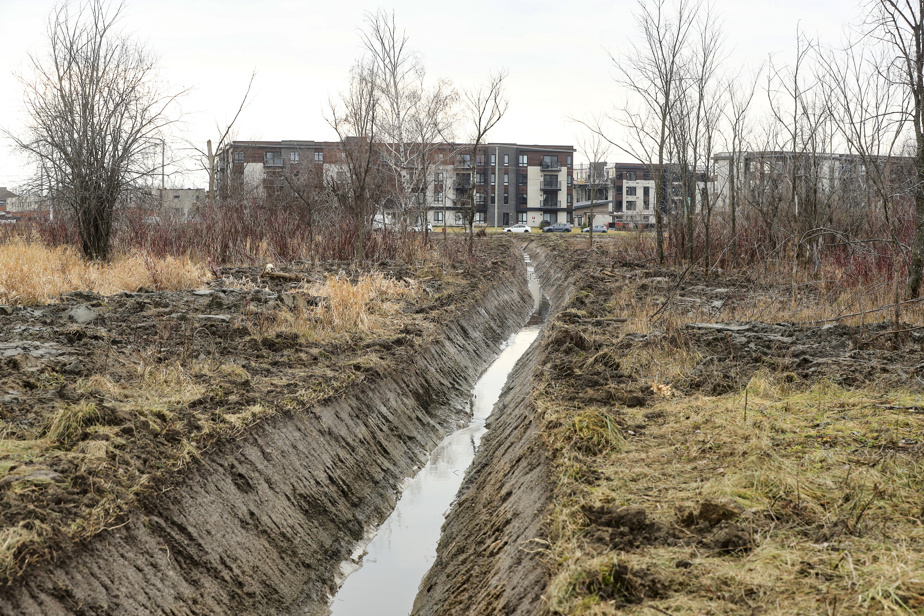Companies that do not respect environmental laws continue to have their projects studied and approved by Quebec. However, Environment Minister Benoit Charette passed new legislation two years ago allowing him to refuse an application for authorization submitted by a “delinquent” promoter.
In recent years, companies such as Rio Tinto, ArcelorMittal and several others have accumulated violations of environmental law, but have still been able to obtain dozens of authorizations from the Ministry of the Environment, the Fight against Climate Change, Wildlife and Parks (MELCCFP) for various projects.
A situation that concerns the Society for Nature and Parks in Quebec (SNAP) and the Quebec Center for Environmental Law (CQDE). These two groups are particularly concerned to see the Department grant a permit to a company that has drained wetlands in the critical habitat of the chorus frog, a threatened species in Quebec and Canada.
The Department is currently studying an application for authorization filed in September 2020 by the company 9370-2413 Québec inc. for an “intervention in wetlands as well as the extension of the water supply, stormwater management and sanitary sewer systems as part of the Pine Beach project”, in Hudson, Montérégie.
This company is owned by Groupe Shathony and businessman Gaétan Houle, both owners of another company (9413-1547 Québec inc.) which drained wetlands in Longueuil two years ago.
According to Alain Branchaud, general manager of CPAWS Quebec, the Ministry of the Environment should more severely punish promoters who destroy natural environments. He believes that the Department could draw inspiration from the Act respecting contracting by public bodies. This provides that companies found guilty of certain offenses are no longer eligible for public contracts for a period of five years.
“In order to restore confidence in the process of issuing certificates of authorization, Quebec should examine the possibility of temporarily ineligible for any new application a promoter who has committed an offense that has led to the destruction of a natural environment, says Ms. .Branchaud. This strong gesture would send a signal that recess is over and that our environmental laws must be respected. »
In November 2020, 9413-1547 Quebec inc. had several drainage ditches dug to dry out wetlands located near Boisé Du Tremblay, in Longueuil. The sector is officially recognized as being home to essential habitat for the chorus frog, an endangered species. Ottawa also adopted an emergency decree to protect the species in Longueuil a year later.
In 2021, the company received a notice of non-compliance from the Ministry for having carried out drainage work in a wetland without authorization, in addition to being fined $10,000 for having discharged a contaminant in a course of water.
A criminal investigation was also launched in January 2021. The Ministry told La Presse that the investigation “is still ongoing” two years later. “Investigations in a file like the one in question may require delays of several months in order to compile the technical and scientific evidence”, specifies the Ministry.
For its part, Groupe Shathony did not want to comment on the ongoing investigation. “Considering that the case is in court, we prefer not to answer your other questions at this stage,” said his representative, Sasha Côté, in an email sent to La Presse. Gaétan Houle did not respond to questions from La Presse.
On its website, Groupe Shathony specifies that its residential project in Hudson was to begin in 2021. The company also indicates on its website that it is still planning a real estate project in Longueuil in 2022-2023 in the sector covered by a decree of Ottawa emergency prohibiting all subdivision.
This case is of concern to the CQDE, reports its lawyer Marc Bishai.
It should be noted that the Minister of the Environment has new powers since the adoption in 2021 of Law 102, which allows him, among other things, to refuse an application for authorization submitted by a “delinquent promoter”. At the time of the tabling of his bill, Minister Benoit Charette expressed his frustration at seeing “offenders” able to obtain new authorizations from his ministry.
La Presse asked the office of Minister Benoit Charette if these new legislative provisions had been invoked since their entry into force. We received no response.
In the past 15 months, Rio Tinto has received nine administrative monetary penalties totaling more than $53,000 for environmental violations. During the same period, ArcelorMittal received seven penalties totaling $35,000. These two companies have been ramping up environmental violations for more than 10 years. The Canadian branch of ArcelorMittal was also fined 14.5 million in 2022 for breaches of Canadian environmental laws.
“Environmental protection and sustainability are core values within our organization and we have also been investing heavily to protect the environment for some years now. We will continue to do so,” says ArcelorMittal Communications Director Annie Paré.
“We work closely with our partners and employees, who are extremely aware and make daily efforts to protect the environment. […] When an incident occurs, Rio Tinto takes the situation very seriously, puts in place a rigorous action plan and implements measures to correct the situation,” says Simon Letendre, Director of Media Relations for Canada and the United States.
Over the past 10 years, ArcelorMittal and Rio Tinto have nevertheless obtained dozens of authorizations from the Quebec Ministry of the Environment for projects that had to comply with the province’s environmental laws.
Lawyer Marc Bishai believes that Quebec could “strengthen the environmental legal framework so as to make penalties more dissuasive, for example by setting fines calculated according to the company’s income”. He gives as an example the federal law on competition which provides that a penalty can be set at 3% of the gross income of a company.

